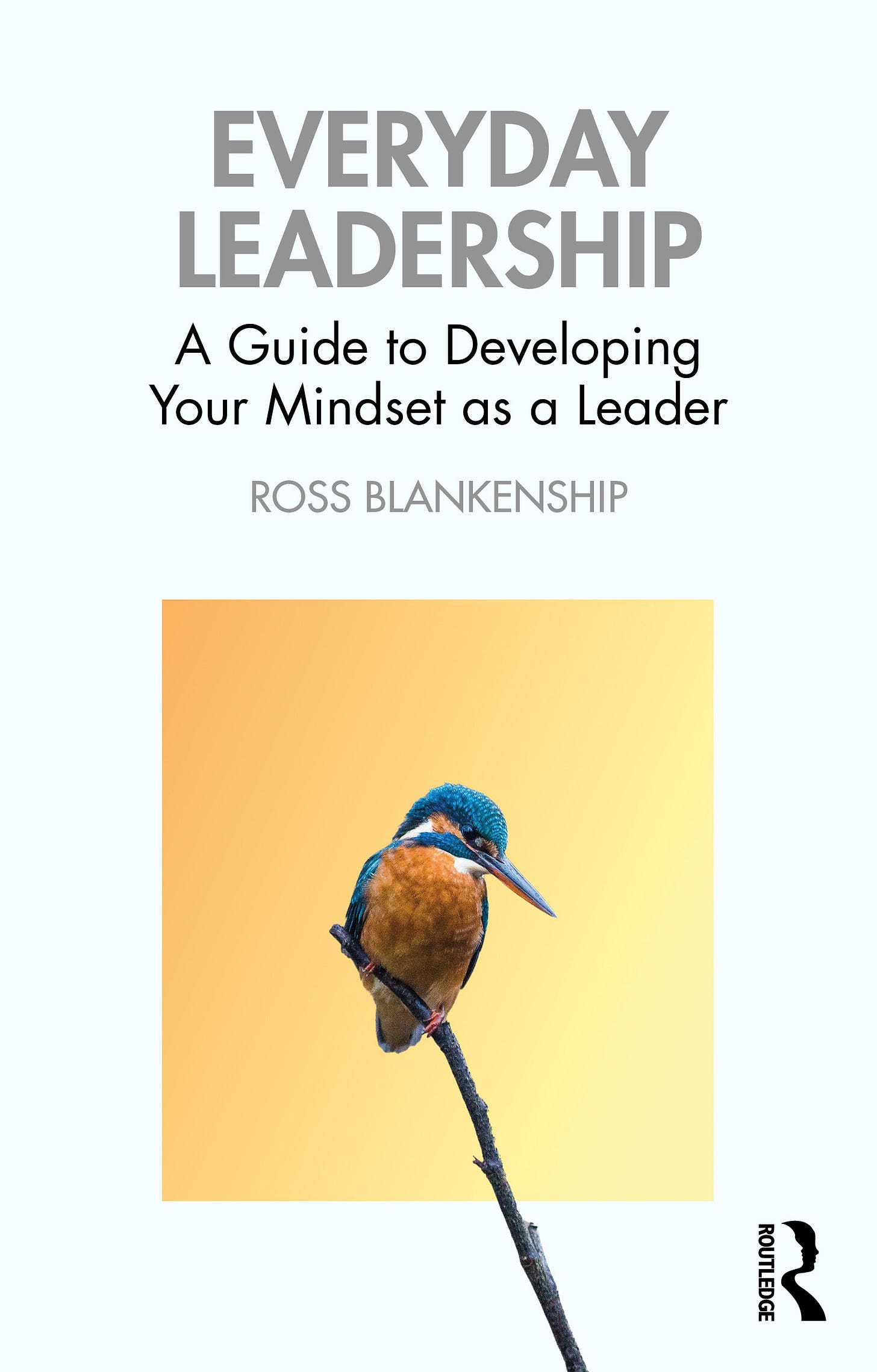Answering 5 Questions About Writing
On choosing titles, getting rejected, and writing as a parent.
In just two weeks, Everyday Leadership will be released (December 11th!), which I’m excited about. If you haven’t pre-ordered it yet, and would like to, test out this fancy button I made →
In prep for the release, I’ve been trying to learn as much as a I can about book promotion, and how to get to the word out as much as I can in a way that still feels genuine and not overly salesy. I’m not entirely sure where that line is, because in some ways it feels like this book is all I talk/write about at the moment, and yet I am continually surprised by how hard it is to build any kind of awareness.
One resource that I’ve really appreciated is
’s book Show Your Work!, which is about letting others see how you think, work, and create, highlighting the messy, very flawed human side of making a thing instead of just the polished, finished work.To that end, I recently enjoyed reading
’s Q&A about his new book and thought it might be fun to answer some of the same questions. So here they are:How did you choose the title/subtitle?
I actually had to go back and do some digging to figure out where the title/subtitle came from. The earliest mention I could find of the idea for everyday leadership on my computer was in a pitch to a company called “Authoritive” in December of 2021. We had been talking about making a text-based leadership development course aimed at helping people learn how to give better feedback. I was calling it everyday leadership because it seemed like a good hook for something promoting having better feedback conversations on a daily basis. (Side note: Authoritive went on to partner with *slightly* more well known folks than yours truly, but I suppose the conversation was of some use).
By the end of September 2022, I was pitching agents a book called “Everyday Leadership: The Small Actions That Lead to Big Results.” I wasn’t quite sure what I meant by that subtitle because I knew I didn’t want to write a book that was just a laundry list of skills that I thought were relevant to leading. I was/am more interested in the philosophical concept of everydayness than I am in everydayness as a way of talking about daily habits or rituals. Think of Walker Percy’s subject in The Moviegoer: “The search is what anyone would undertake if he were not sunk in the everydayness of his own life.” And, in fact, by mid-October I had dropped the subtitle altogether in the queries I was writing.
Forty-two (42!) rejections later, I was pitching “Everyday Leadership: Unlocking the Leadership Mindset and Potential Within Us All.” And by the time I actually had a conversation with my commissioning editor at Routledge (who’s publishing the book) I was just calling it “Everyday Leadership: A Guide for the Newly Promoted.” I actually quite liked that idea because I felt like the title included a sort of trigger point for when someone might buy it and read it. The editorial board at Routledge was worried it would make it sound like it was only aimed at people in their first leadership positions rather than what I intended, which was something like any time you get promoted at any level. So, we went back and forth a bit and landed where we landed: Everyday Leadership: A Guide to Developing Your Mindset as a Leader.
How did the process of writing this book differ from writing your first book?
This book is so different from my first book, it’s hard to really know how to describe it. My first book (Assessing CEOs and Senior Leaders) is much closer to a textbook on executive assessment for graduate students and people who use/conduct executive assessments professionally. It was incredibly research heavy, and much more concerned with pointing toward the scientist-practitioner model of doing a certain type of consulting. Or to put it simply, as a close friend recently told me, “Your first book is good, it’s helpful, but it’s also boring.” So it goes.
The process of writing this book then was much more of a confusing journey. While it is grounded in a lot of psychological research, it required a lot of energy and effort to not just talk about research and why I thought it was interesting, to push beyond one of my favorite editorial admonishments: “This is all interesting for readers who want a history of leadership theory.”
My first book was like a step to the left of dissertation writing. I figured Everyday Leadership would be just one more step to the left. So I just jumped in and started writing. As I’ve written about before, this seemed to be working until it didn’t. I arrived at page 75 and realized that I was bored with what I was writing and wanted to quit. Fortunately, with the help of some expert editorial guidance, I chucked that first draft and started over in a much more casual tone.
Learning to write less academically is something I’m still working on (and a lot of that work occurs here…). It’s much more personal, feels overly casual at times, and I hope is much easier, more interesting, and more useful to read.
How did you think about your audience this time?
I kept trying to imagine my audience as a single person in this scenario: I’m getting a drink with a friend who’s just gotten promoted, or started a company, or taken on a new team. This transition has them questioning their ability to lead others and they’re looking for any kind of insight about leadership that might help. We sit at the bar, probably a dark bar drinking negronis or old fashioneds, and they say something like, “Is there anything you can tell me that might help me do this better?” That though shaped everything from how much research I included directly in the text, to the tone, to the overall length the book. The book is basically my half of that conversation. Generally, I think the audience of the book as anyone going through a transition in their work, especially if that transition has you wanting to think more clearly about what leadership means in your own life.
How did you decide the direction of the book, what to include and where to draw the line, how to build it up, and did you write with a specific reader in mind?
I wrote the book in response to other leadership books that I’d read that had left me feeling flat. So many of the books in this space seem to me to be a few great ideas and a whole lot of padding and case studies. I frequently find myself skipping through them with mild interest looking for the ideas that are useful. That’s why I wanted this book to be short (it came out at about 130 pages including a workbook). I wanted the book to be easy to read and digest and to feel approachable to a reader with limited time. For example, I cut a chapter called “What an Organization Does,” because it didn’t exactly fit the trajectory as a primer on leadership and with the goal of helping someone think more clearly about leadership in their own life.
How do you write as a parent?
The short honest answer is tired. The slightly longer version is I’m not writing the world’s great art here, but it does take attention and motivation and creative discipline to get a thing written. I had the, I suppose fortunate, circumstance to learn about book writing as a parent, so I’ve never known how expansive a day of writing could be. that I try to weasel time away when I can work on a writing project. Usually that means getting up early in the morning before the girls are up or staying up later in the evening after the girls are sleeping. My editor on my first book gave me some good advice that I more-or-less tried to apply to this project as well which I remember as this: try to touch the project at least once a day, even if just for 15 or 20 minutes, and try to work on it for a good long chunk of time (say 3-4 hours) at least once a week. I did not keep that pace up, and practically spent the month of September in a funk glaring at a printed copy on the side of my desk. But you know, more-or-less that’s what I did.
Another thing to say about this - and I attribute this to “writing as a parent” - is that inevitably there is a point in working on such a project when I have to reconcile myself to the fact that the thing that I’m creating, the pages that are actually accumulating, are the only version of the thing that I can create in this moment in time. It’s not the magnificent thing in my head, but it’s the one that a tired parent can pull together in early mornings and evenings. And maybe that’s useful still.
Have a question about the book or writing process? Ask it in the chat and I’ll try to answer it.
And stay tuned for the post I’m sending out next week: “Writing Emails to Nobel Laureates.”





